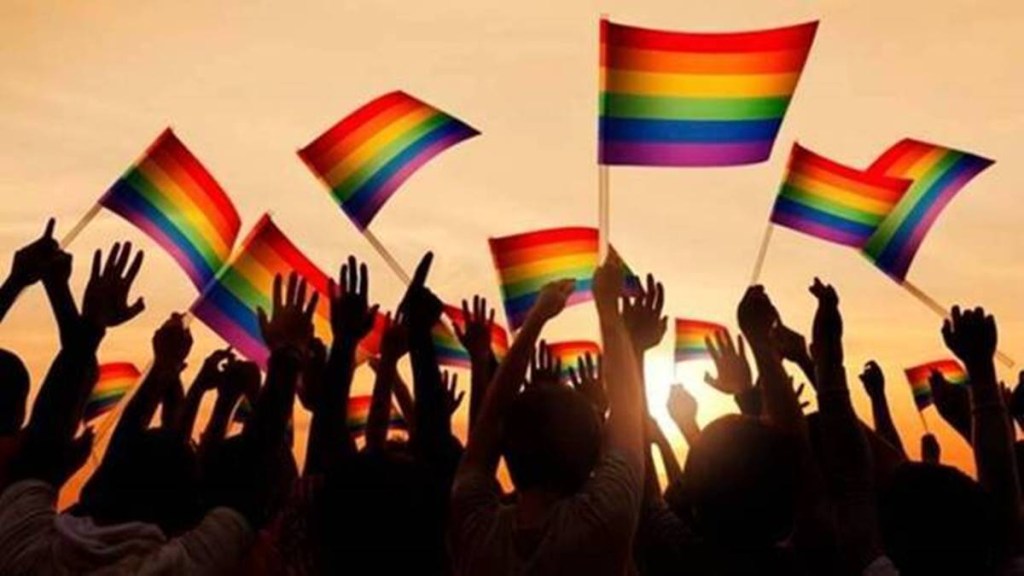The Supreme Court on Tuesday orally observed that there was no absolute concept of ‘man’ or ‘woman’ and the matter was not about “what your genitals are”. The remarks by Chief Justice of India DY Chandrachud came as the Constitution bench of the top court began to hear a batch of pleas seeking legal recognition for same-sex marriage yesterday.
“There is no absolute concept of a man or an absolute concept of a woman at all. It’s not the question of what your genitals are. It’s far more complex,” CJI Chandrachud remarked when Solicitor General of India SG Mehta, appearing for the Centre, submission that the legislative intent of the Special Marriage Act has been a “relationship between a biological male and a biological female”.
Also Read: Same-Sex Marriage Verdict Live Updates: Supreme Court’s judgment on marriage equality case shortly
“Even when Special Marriage Act says man and woman, the very notion of a man and a woman is not an absolute based on genitals,” the CJI remarked.
Won’t venture into personal laws: Supreme Court
The discussion came when the Supreme Court bench said it will steer clear of the area of personal laws and only examine if the right to same-sex marriage can be conferred under The Special Marriage Act (SMA), 1954.
A five-judge Constitution bench, presided by CJI Chandrachud and comprising Justices Sanjay Kishan Kaul, Ravindra Bhat, Hima Kohli, and PS Narasimha, said it will restrict itself to the SMA and not broaden the canvas.
The scope of the hearing, CJI Chandrachud said, would be limited to developing a notion of a “civil union” that finds legal recognition under the Special Marriage Act.
Several Acts could be rendered unworkable: SG Mehta for Centre
“Biological man means man with biological genitals. I didn’t want to use that phrase. If the notion is treated to be a guiding factor to decide a man or a woman, I’ll show several acts which your lordships would unintentionally make non-workable,” SG Mehta said, countering the CJI’s observation.
“If I have genitals of a man but otherwise am a woman, as being suggested, how will I be treated under CrPC? As a woman? Can I be called for 160 statement? There are several issues,” he said, suggesting that the matter would be dealt with better by Parliament.
The Centre, in its affidavit before the top court, argued that allowing same-sex marriage would result in the reading down or rewriting of an entire branch of law. It has also argued that the issue was outside the domain of the judiciary and cited examples of other countries which have taken the legislative route to allow same-sex marriage.
Also Read: ‘Marriage an exclusive heterogenous institution’: Centre reiterates stand on same-sex marriage pleas
What the petitioners say
Senior Advocate Mukul Rohatgi, appearing for one of the petitioners, pointed to the stigma faced by same-sex couples to argue that it can only be removed through a constitutional declaration.
Rohatgi further said that the test of popular acceptance is not enough to deny one community’s fundamental rights. Requesting the court to grant a declaration of the petitioners’ right to life under Article 21, Rohatgi said, “Procreation in today’s scenario can also include adoption, IVF, surrogacy and it need not be procreation in only one form… My right under Article 21, read with 19 and trifecta of 14,15,16 is what I’m seeking.”
Advocate Menaka Guruswamy, also arguing for the petitioners, said it’s a question of an individual’s rights. “Marriage is a question of rights. I am not able to notify my partner for life insurance. I cannot buy insurance from the Supreme Court Bar Association for my family,” she said.
Centre files fresh affidavit
The hearing in Supreme Court which ended on Tuesday, are scheduled to continue on Wednesday and Thursday. The Centre, in a fresh affidavit filed today, said that all states should be made party to the case.
The Centre is also learnt to have written to all states seeking their views on the issue of same-sex marriages. The states have been asked to respond within 10 days.

